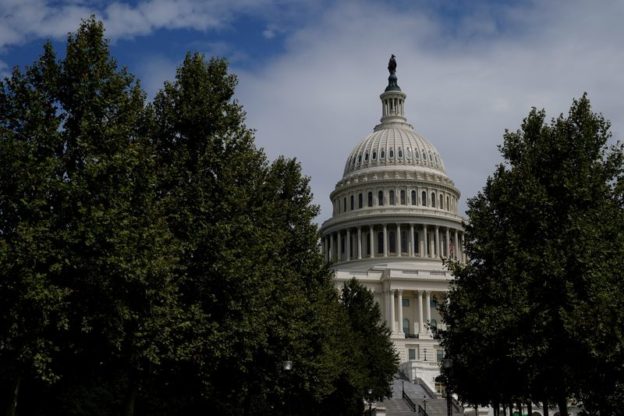Please try another search
Economy6 hours ago (Sep 14, 2021 11:02PM ET)
© Reuters. FILE PHOTO: The U.S. Capitol Building is pictured in Washington, U.S., August 20, 2021. REUTERS/Elizabeth Frantz
By Richard Cowan and David Lawder
WASHINGTON (Reuters) – U.S. tax code changes sought by Democrats in the House of Representatives to help fund $3.5 trillion in domestic investments would cut annual tax bills for Americans earning less than $200,000 a year through 2025, a congressional estimate showed on Tuesday.
The bipartisan Joint Committee on Taxation estimated that expanded tax credits for children and earned income would mean people in lower-income brackets would pay far less in taxes in 2023 under the Democratic plan, which is being debated this week in the tax-writing House Ways and Means Committee.
At the other end of the income scale, tax collections from those earning over $200,000 would rise slightly in 2023, escalating to a 10.6% increase for people earning $1 million and more, the committee said.
By 2027, after an expanded Child Tax Credit expires, those earning between $30,000 and $200,000 would start to see slightly higher tax bills, according to the estimate.
REVENUE GAINS, LOSSES
The joint committee, which estimates tax revenue and credit provisions of legislation, estimated that tax increase proposals now under debate in the House Ways and Means Committee would directly raise some $2.07 trillion over 10 years.
The plan would raise the top individual income tax rate to its pre-2017 level of 39.6%, from 37% currently, on taxable income above $400,000 with a 3% surcharge on income above $5 million.
It increases the capital gains tax rate to 25% from 20% for those earning more than $400,000 but tones down President Joe Biden’s proposed measures to tax more inherited wealth within rich families.
The joint committee analysis suggests the House plan may break Biden’s pledge not to raise taxes on those earning less than $400,000, as the $200,000-$500,000 income category would see a 0.3% increase in 2023. Those earning $50,000-75,000 would see a 1% increase in 2027.
Democrats in coming weeks are trying to push the $3.5 trillion bill through Congress to carry out Biden’s agenda of expanding child care, investing in education, green energy, health care and social services for the elderly and poor.
The joint committee estimated the provisions to pay for these initiatives would total $1 trillion from increased taxes on high-income individuals over 10 years, and $963.6 billion from increased taxes on large corporations.
These would be offset by tax credits for children, low-income workers, electric vehicles and clean energy, infrastructure finance and other tax code provisions that will reduce revenues by $1.2 trillion over 10 years, leaving a net revenue gain of about $871 million.
The joint committee analysis excludes direct spending impacts of the Democrats’ legislation, which will be estimated by the Congressional Budget Office.
REPUBLICAN WALL
Republicans solidly oppose the Democratic plan, saying it will result in higher taxes for middle-class people as well as the rich. They have warned that this will prompt job losses, an economic slowdown and higher inflation.
Democrats are maneuvering to win passage without Republican support through a budget “reconciliation” process that would allow their measure to advance in the 100-member Senate by a simple majority, instead of the 60 normally required.
The Senate is split 50-50 between Democrats and Republicans.
Related Articles
Disclaimer: Fusion Media would like to remind you that the data contained in this website is not necessarily real-time nor accurate. All CFDs (stocks, indexes, futures) and Forex prices are not provided by exchanges but rather by market makers, and so prices may not be accurate and may differ from the actual market price, meaning prices are indicative and not appropriate for trading purposes. Therefore Fusion Media doesn`t bear any responsibility for any trading losses you might incur as a result of using this data.
Fusion Media or anyone involved with Fusion Media will not accept any liability for loss or damage as a result of reliance on the information including data, quotes, charts and buy/sell signals contained within this website. Please be fully informed regarding the risks and costs associated with trading the financial markets, it is one of the riskiest investment forms possible.

Comments are closed